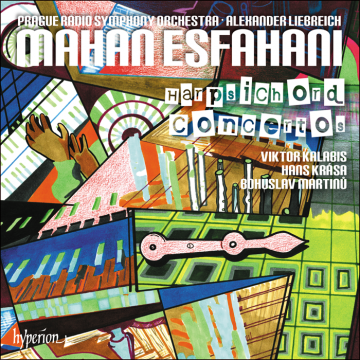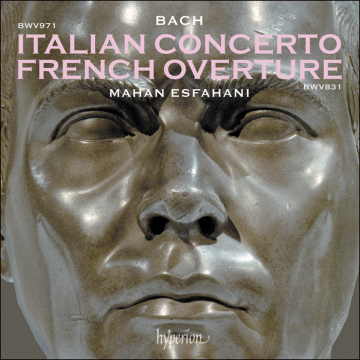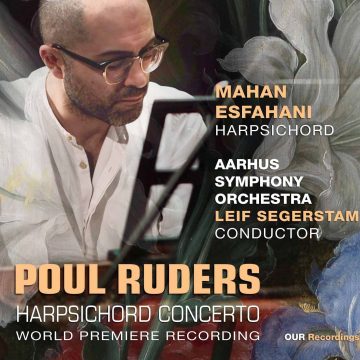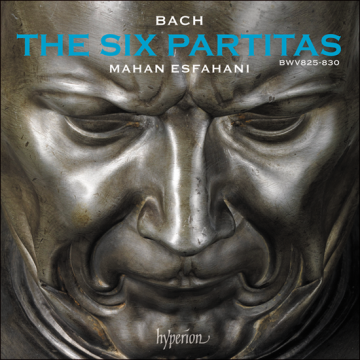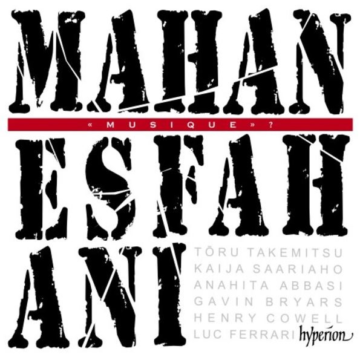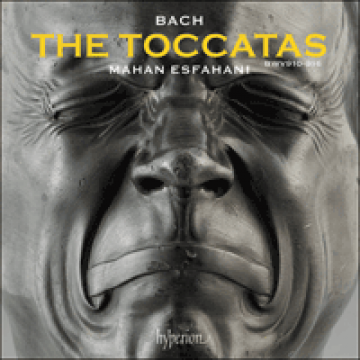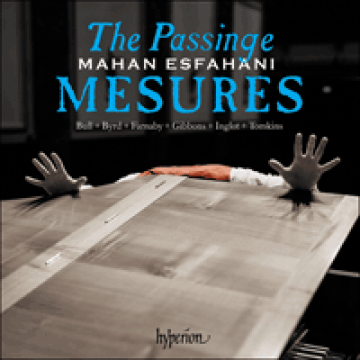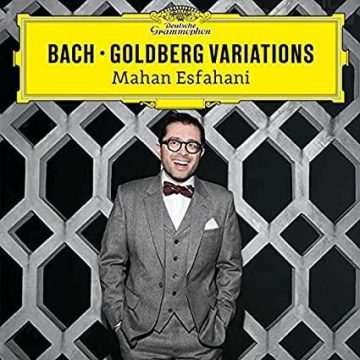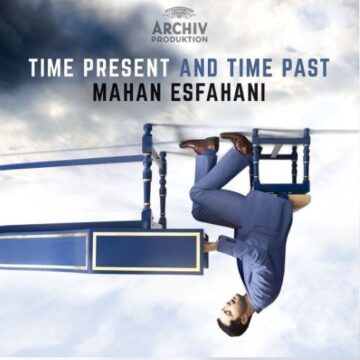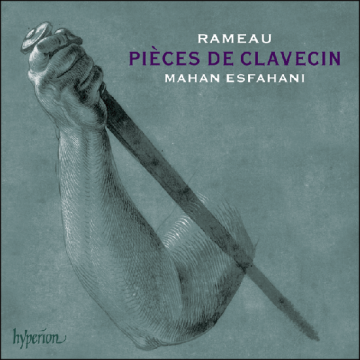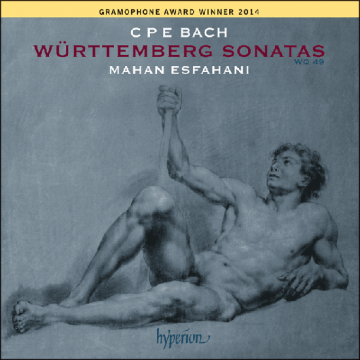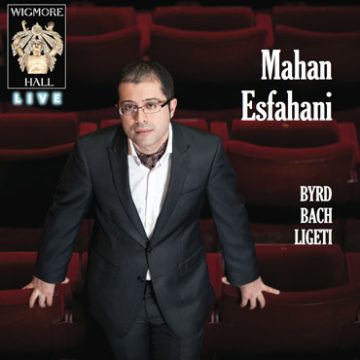Since making his debut in London in 2009, Mahan Esfahani has made it his life’s mission to re-establish the harpsichord in the mainstream of concert instruments. To that end, he is the first harpsichordist in a generation to be active in virtually all areas of music-making from large completist projects of earlier composers to commissioning over twenty new solo and concertante works for the harpsichord. His extensive work in performing modern and new concertos for the harpsichord — from the earlier pioneering works of Falla (1926), Martinů (1935), Gerhard (1956) to new ones by Coll (2017), Ruders (2021), Srnka (2023), Bryars (2023), et al. — has seen him as a soloist partnering with the leading conductors of the day: François-Xavier Roth, Ilan Volkov, Ludovic Morlot, Leif Segerstam, Andrew Manze, Joshua Weilerstein, Jiří Bělohlavek, Yalda Zamani, Andris Poga, Ken-David Masur, Thierry Fischer….
With recitals of the entire range of old and new harpsichord literature at London’s Wigmore Hall, New York’s Carnegie Hall, the Concertgebouw of Amsterdam, the Wiener Musikverein, Klavier Festival Ruhr the Edinburgh International Festival, Schleswig-Holstein Festival, the Konzerthaus Berlin, Tokyo’s Suntory Hall, the BBC Proms, the Walt Disney Hall of the Los Angeles Philharmonic, Madrid’s Fundacion March, L’Auditori Barcelona, Zürich’s Tonhalle, and Beijing’s Forbidden City Concert Hall, Esfahani has taken the harpsichord beyond the realm of the esoteric into a new area of appreciation from all angles of concert life. His work with new music has extended to collaborations with leading and emerging composers of the day: Gavin Bryars, Miroslav Srnka, Kaija Saariaho, Brett Dean, Poul Ruders, Daniel Kidane, Laurence Osborn, Francisco Coll, Anahita Abbasi, Atsuhiko Gondai, Marcus Rock, Nilufar Habibian, to name a few.
The 2025-26 season sees a number of important milestones in Esfahani’s work that demonstrate the broad range of his interests. As the artist-in-residence of the 2026 Leipzig BachFest, he demonstrates his dedication to the work of J.S. Bach — the entirety of whose keyboard output he is currently recording to significant critical acclaim for Hyperion Records — whilst concurrently performing in a new onstage role written especially for him in Brett Dean’s new opera Of One Blood at the Bayerische Statsoper in Munich under the direction of Vladimir Jurowski. This season alone sees a variety of new commissions including an ensemble piece by Calliope Tsoupaki for Esfahani and the Nederlandse Bachvereniging, a new concerto by Julian Grant, a new solo work by Nilufar Habibian for the Elbphilharmonie in Hamburg, and a commission by Alberto Carretero as part of a programme of four modern Spanish harpsichord concertos for the Festival Internacional de Musica de Granada. Meanwhile, he is presenting a three-concert series on the work of Domenico Scarlatti at London’s Wigmore Hall, returns to New York’s Frick Gallery with Bach’s Art of Fugue, records concertos by Gavin Bryars, Gary Carpenter, and Caroline Shaw with the Royal Liverpool Philharmonic, and has a guest curatorship of modern chamber music and the entirety of Bach’s Well-Tempered Clavier at the Czech Philharmonic.
Esfahani’s extensive discography — in addition to the ongoing complete series of Bach’s keyboard works for Hyperion/Universal — includes an album of 20th-century Czech harpsichord concertos for Hyperion that won a 2023 Opus Klassik in Berlin, sonata by CPE Bach (Gramophone Award 2014), the complete keyboard pieces of Jean-Philippe Rameau (New York Times Best Recordings 2014), and the album Musique? of modern electroacoustic works for harpsichord (Preis der deutschen Schallplattenkritik quarterly list 2021). Recording collaborations include the Brandenburg Project on BIS with the Swedish Chamber Orchestra/Dausgaard, Dutilleux’s Les Citations with the Seattle Symphony/Ludovic Morlot, and four albums with Michala Petri — a collaboration particularly close to his heart. The totality of these activities is attested by extensive features on his work in The New York Times, Gramophone, De Volkskrant, and a variety of music industry and culture publications. In 2022 he was awarded the Wigmore Hall Prize.
Following studies in musicology and history at Stanford University, Mahan Esfahani studied privately with Peter Watchorn in Boston before completing his formation as the last student of the celebrated Czech harpsichordist Zuzana Růžičková. Following a period as artist-in-residence at New College (Oxford) he continues his non-musical activities as a guest instructor in various international courses and as a frequent cultural commentator for such publications as The New Yorker, The Critic, and Engelsberg Ideas. Born in Tehran and raised in the United States, he went on to live in Milan, Oxford, and London before finally making his home the past decade in Prague.
This biography is for information only and should not be reproduced.
Sunday Afternoon Baroque Series recital
Amsterdam Concertgebouw, March 2025
Esfahani made his melancholic Pavan MB 16 sound meditative and dreamy, emphasized the humour and impetuosity of the lively The Woods so Wild MB 8 and gave free rein to his imagination in the virtuoso Fantasia on the Second Tone, in which no instrumental obstacle – runs, sequences, ornamentations, trills – cost him any effort...
As a born storyteller, Esfahani gave each sonata its own character, as if they were mini-scenes from a frame narrative with which Scarlatti already pointed ahead to the imminent 'Sturm und Drang' period. It sounded beautiful.
Wenneke Savenije, De Nieuwe Muze
Preludes, Inventions & Sinfonias, Hyperion (CDA68448)
Released August 2024
With five predecessors in the bag, you might think that Mahan Esfahani’s latest survey of Bach’s keyboard music only contains odds and ends. True, the items, variously played on a harpsichord and clavichord, are brief: the album contains 55 tracks, the shortest, capturing a surviving fragment, lasting 32 seconds. But Bach’s genius is so pervasive in these preludes, inventions and sinfonias, and Esfahani’s playing so lively and subtle, that no one should bemoan the absence of grand musical architecture. Hyperion’s recording and engineering spread their own delight by treasuring the dying reverberation of a piece’s last note and taking a helpful breath before plunging us into the next jewel. This is the kind of album you wish would never end.
Geoff Brown, The Times
Recital at Edinburgh International Festival
Queen’s Hall, Edinburgh, August 2024
Iranian-American soloist Mahan Esfahani is among the foremost harpsichordists of his generation, committed to keeping the instrument alive today. Here he explored varied dimensions of middle and late Baroque repertoire with deep sensitivity, musicality and considerable technical mastery.
Esfahani opened with Wilhelm Friedemann Bach’s Fantasia in E minor F21. Negotiating a flurry of notes with smoothness and aplomb, he moved straight on to Handel’s contrasting Chaconne in G HWV 435, full of ornamentation and swagger in its 21 variations on a sarabande. The main feast was Bach senior’s definitive, seven-movement Partita No 4 BWV 828. This was a masterclass. Esfahani’s main focus is contemporary harpsichord music, but he is a fine exponent of high Baroque chromaticism too.
After the break attention turned to companion influences on Bach and Handel. Pachelbel’s Chaconne in F minor is slow and tender. C P E Bach’s Fantasia II in C lives up to its name, exuding elements of carnivalesque lightness and mischief. Perhaps the highlight of a compelling recital was Buxtehude’s La Capricciosa, 32 demanding variations on a Bergamasca melody and chord progression. These include hints of Bach’s Goldbergs and huge stylistic shifts, ending with a gothic stomp. Esfahani excelled in it all.
Simon Barrow, The Scotsman
Mahan Esfahani met with only cheers at his Edinburgh International Festival appearance. With daylight banished by curtains, Esfahani and his titanic, self-commissioned harpsichord, “Queen Mary” basked in the spotlight. Opening with the continually cascading Bach Fantasia in E minor F21 certainly set his stall out. His hands danced across the keys with speed and precision, the singular sound of hammer on strings raising nostalgic feelings in children of the 80’s and 90’s...
Esfahani slips from the intimate to the extrovert with ease, and it’s infectious to be part of.
Closing with Buxtehude’s La Capricciosa BuxWV 250, Esfahani dived into a sea of variations which almost certainly were on Bach’s mind when he sat down to pen his Goldberg Variations. More than 30 short variations proved no challenge to Esfahani who constantly listens to his instrument as part of an evolving conversation. As demonstrations of skill and touch go, it’s hard to imagine a better, or less heard, test.
WJQuinn, The Quinntessential Review
Brandenburg Concertos with the Milwaukee Symphony Orchestra
Milwaukee, March 2024
Most of the focus was on Mahan Esfahani, an elite harpsichordist, who dazzled in the first movement’s kaleidoscopic cadenza. The Affetuoso second movement, pared down to a violin/flute/keyboard trio, allowed all the lines to be heard. Wong and Slocum played wonderfully together, their movements and emotions in sync. The finale once again belonged to Esfahani, his harpsichord burbling and trilling as an assertive member of the ensemble...
Between the two concerts, a panel discussion took place in the upper atrium with Wong, Esfahani, Masur, and MSO choir director Cheryl Frazes Hill. The talk covered topics from the communal nature of performing Bach to the composer’s legacy and long history of neglect. Mahan Esfahani’s input was the most provocative, challenging the very concept of festivals that put composers on a “pedestal” or trying to assign universal claims to their music, but then he reiterated his appreciation for Bach in the most poetic terms. Based on his probing thoughts, I would be interested to hear him speak at length on any musical topic...
As soloist in Bach’s Harpischord Concerto No. 4, Mahan Esfahani was authoritative and engaging. I enjoyed hearing how he unfurled the solo lines in the slow movement against the ensemble’s stark accompaniment.
Brendan Fox, Shepherd Express
Recital at Stanford
Stanford, March 2024
Esfahani opened with Tomkins’s “Pavana FvB CXXIII,” playing with remarkable control, beautifully highlighting its melancholy nature...Following the lighthearted “Courante,” the “Sarabande” provided an incredible contrast. Esfahani presented the movement’s heavy anguish and penetrative longing with remarkable authenticity and touch. His range in musical expression truly shone through in this movement, with an air of dark solemnity providing for an incredible listening experience...The second half of the concert revealed some of the most exciting and unique renditions of the music of Domenico Scarlatti I have ever heard. The explosiveness and energy that Esfahani brings to his music were truly at their best here. For instance, in “Sonata K. 28,” Esfahani created incredible vigor through the imitations of Spanish guitar technique Scarlatti embedded in the piece, offering a thrilling adventure through the lively work. I’ve never heard a more convincing and exciting rendition of the piece, and I absolutely loved it. In the final “Sonata K. 436,” Esfahani coupled his playfulness with virtuosity. He showcased his astounding ability to play with audience expectations by withholding cadential resolutions or playing moderately-paced scales that quickly snowballed into surprising eruptions.
Eric Wang, Stanford Daily
Recital at Bath Bachfest
Bath Guildhall, Feb 2024
The next day, harpsichord superstar Mahan Esfahani played a programme of Handel (Suite No 2 in F major), Buxtehude (La Capricciosa) and JS Bach (English Suite No 6 in D minor). The expressivity of the Handel and the sheer virtuosity of the Buxtehude – a set of variations in which Esfahani seemingly turned a million black dots into a murmuration – led, with well-judged logic, to the Bach: palindromes, enigmas and a “mirror” fugue to make your head hurt (despite Esfahani’s lucid advance explanation), but finally, and unquestionably, best heard as music.
Fiona Maddocks, The Guardian *****
The French Suites, Hyperion (CDA68401)
Released October 2023
Mahan Esfahani’s extensive, often entertaining notes explain the decisions behind this new recording including variants and additions alongside all the familiar movements. A main beneficiary is the fourth suite in E flat that gains an improvisatory prelude, a second gavotte and a minuet. Esfahani also includes what he describes as three ‘Orphan Suites’, comprising works connected to Bach either by a single ascription, as in the G minor Suite, or via the copies of pupils, presumably based on their teacher’s work. Whatever their provenance, the music rarely disappoints.
All credit to Esfahani for this carefully prepared recording...there is much to enjoy in playing that displays poise and expressive nuance as well as virtuosity...enjoyable performances of the first three French Suites and two of the ‘Orphan Suites’ on a clavichord with a modest, but expressive dynamic range that admirably suits the delightful intimacy of these works.
Jan Smaczny, BBC Music Magazine
If the clavichord added a sense of intimacy to the earlier recording, here its more quicksilver touch has had a profound impact on the interpretation, including those works played on the harpsichord. The music feels more vocal, especially when the performer avails himself of the dynamic shading of the clavichord but also in the extension of melodic lines into more lyrical shapes on the harpsichord. Ornamentation is different, too, slightly extended for greater internal shape and nuance, rather than explosive or gestural additions to the line. Listen to the Sarabande of the D minor First Suite, in which he deploys small decrescendos as the top line rises, suggesting not just the human voice, but the human voice doing one of its most miraculous feats: scaling down as it rises up, registering frailty, uncertainty or pleading.
Philip Kennicott, Gramophone Magazine
The sound [of the clavichord] is so seductive; the delicacy, the gentle chirpiness, the almost reedy timbre at times, and the way the notes sometimes bend under the finger pressure. And then there’s Esfahani’s fragrant ornamentation and embellishment, so beautifully integrated with Bach’s lines, the feeling that the music is coming fresh from his and Bach’s imagination—so intimate—before what Mahan calls the ‘rich snarl’ of his modern hybrid harpsichord in some of the suites. The whole album seems as though it’s been designed to question our assumptions and prejudices in the most enlightening way
BBC Record Review
If the clavichord added a sense of intimacy to the earlier recording [of the Notebook for Anna Magdalena], here its more quicksilver touch has had a profound impact on the interpretation, including those works played on the harpsichord
Gramophone Magazine
The best years of the harpsichord are still ahead of it—even though too many people mistakenly consider it to be a relic of the Baroque. This appears to be Mahan Esfahani’s working assumption, since, alongside commissioning and recording new music for his instrument, he’s also actively engaged in recording the complete keyboard works of JS Bach—with all the freshness he brings to modern composition. Here, you feel as though Esfahani has ingested the French Suites whole, and that his performances, split between harpsichord and clavichord, are a real-time working-out of how to mould Bach contrapuntal nests so as to reveal their inner lyricism. This is playing of daredevil spontaneity, backed up by intense scholarly discipline.
Philip Clark, Prospect Magazine
Everything sings, everything dances, I breathe and I savour the art of this genius of the harpsichord
Artamag, France
Corellimania, OUR Recordings (6220682) with Hille Perl and Michala Petri
Released 13th October 2023
Few [discs focussing on Arcangelo Corelli] make for such a consistently gripping and gorgeous listen as this one does. This is a delectable combination of instruments: the slightly rugged tonal richness and depth of Hille Perle’s 1686 Matthias Alban viola da gamba, meeting the sparkling whoomph of Esfahani’s double-manual Kramer-built Italian harpsichord, and Michala Petri’s assortment of Baroque recorders (A=415) by Swiss maker Heinz Ammann...For an entirely different-coloured example of how brilliantly the three instruments and musical personalities blend and bounce off each other, I also can’t get enough of Telemann’s Sonata Corellisante No 2 in A, where Petri is on a sweet-toned soprano, against the glow of Perl in her own soprano registers and Esfahani’s luminous harpsichord. This is a radiant reading, full of tight, sprightly dialogue, its Allemande and closing Corrente the scenes of some of the entire programme’s most ravishing displays of silkily perfect recorder virtuosity and suavely sparky gamba shaping and ornamentation – driven, as across the album, by the sense of energy and intellectual spring radiating out from the direction of the harpsichord.
Three cheers, then, for Esfahani’s solo turn, Handel’s Harpsichord Suite in B flat, HWV434, voiced with such buoyant, rhetorically freewheeling ease that it sounds almost as if the harpsichord is playing itself, and with the Aria variations sitting as its crowning glory – a gradually accelerating crescendo of merrily magnificent excitement that feels on the one hand like a finger in the direction of period-appropriate sophistication (for reference, perhaps give Schiff’s elegant version a spin), and on the other hand, even more sophisticated.
Charlotte Gardner, Gramophone
In interpretations of great virtuosity, the ensemble provides beautiful phrasing and ornamentation in this spontaneous performance. In addition to much lively vivacity, the music also contains sunshine, grace and, at times, a very southern melancholy...The result is atmospheric and lively music-making that captivates with its atmospheric density. Mahan Esfahani shines with an expressive interpretation in Handel’s solo suite HWV 434.
Pizzicato.lu
Recital with the Escher Quartet
Rockport Chamber Music Festival
Mahan Esfahani, an approachable wizard of the harpsichord, conveyed with immediacy why he had become spellbound by the instrument. His playing and communication—alone and with the Escher (String) Quartet—for the Rockport Chamber Music on Sunday were nothing short of stunning...The unusual choices of repertoire, particularly the world premiere of Composer-in-Residence Mark Applebaum’s October 1582, for solo harpsichord, and a few other surprises, made for a remarkable concert...
The final concert segment hailed from the Art of Fugue (BWV 1080) written in Eisenach, Germany, at the very end of Bach’s life. Here the arrangement for string quartet and harpsichord ended with a fade out, as Bach left it uncompleted...
Mahan Esfahani and the Escher String Quartet, together with innovators such as Mark Applebaum, are ensuring the harpsichord’s continuing relevance.
Julie Ingelfinger, Boston Musical Intelligencer
Notebooks for Anna Magdalena, Hyperion (CDA68387) with Carolyn Sampson
Released 5th May 2023
This partnership works well, doesn’t it—Esfahani’s delicate fingerwork and expressive ingenuity on harpsichord and clavichord, and his spontaneous flourishes and attractive ornamentation, combined with the simplicity and accuracy of Sampson’s soprano. Intimate entertainment of the highest quality
BBC Record Review
Mahan Esfahani and Carolyn Sampson open the household doors with a generous selection of pieces from the 1725 notebook... What an unfailingly delightful compilation it is, featuring keyboard galanteries, chorale melodies with or without voice and a wide variety of arias...Esfahani's choice of instrument for each piece, whether clavichord or harpsichord, is well judged...an enchanting programme, affectionately and intimately performed
Nicholas Anderson, BBC Music Magazine - performance ****, recording ****
Mahan Esfahani makes a lot of sense of this delightful compendium of domestic musical miscellanea in a recording that shows a more intimate side to his playing."
Philip Kennicott, Gramophone Magazine *Critics Choice 2023*
Mahan Esfahani - sample programmes
| Concerto repertoire list | |
|---|---|
| Commission repertoire list |
These photos are available to be downloaded.
Right click on a desired image and select the "Save Link As" option.

